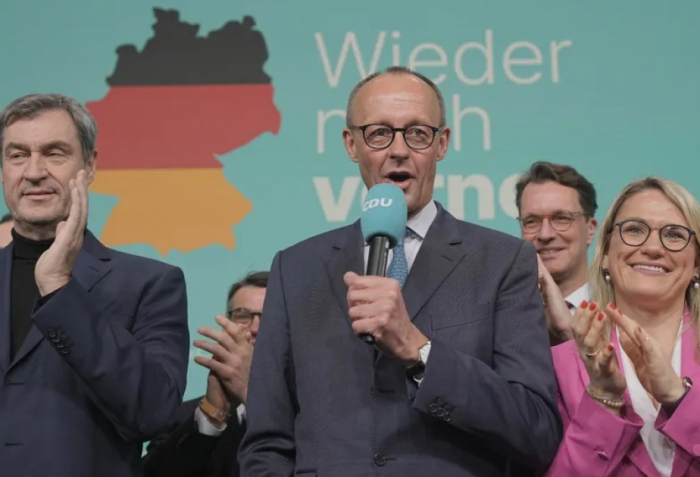“We have won this election,” Merz told jubilant party members during a celebratory speech at party headquarters, calling on his political rivals to move past the heated election campaign.
“The world is not waiting for us, and it is not waiting for lengthy coalition talks. We must now quickly regain our ability to act,” the conservative leader said.
Merz emphasized that quickly forming a stable coalition government was crucial for addressing domestic challenges, strengthening Germany's presence in Europe, and rebuilding international trust.
According to the latest projections by public broadcaster ARD, the Christian Democrats were projected to win 28.5% of the vote, up from 24% in the previous federal election in 2021. However, the CDU/CSU alliance of conservatives fell short of the absolute majority required to govern alone.
Chancellor Olaf Scholz's Social Democratic Party (SPD) faced a historic defeat in the elections, projected to receive 16.5% - the lowest vote share for the center-left party since 1949.
Scholz conceded defeat and told supporters at party headquarters that he takes full responsibility.
"Last time, when the election result was better, I was responsible. This time, with a poor result, I am equally responsible," he said.
The far-right Alternative for Germany (AfD) party was set to score its best-ever result in a federal election, polling at 20.6%. Having almost doubled its vote share compared to the previous election, it has become the second-most powerful political force in the country.
However, the AfD has no chance of joining a coalition government as all other political parties, including the Christian Democrats, have rejected any cooperation with them due to their anti-democratic tendencies.
Foreign Minister Annalena Baerbock’s Green Party was set to win 11.8% of vote, a 2.9% drop compared to the previous elections in 2021. The socialist Die Linke party was the biggest surprise of the election night, winning 8.7% of vote. The party's support surged from 3% in polls three months ago, bolstered by its campaign promising tougher opposition to the rise of the AfD.
Voter turnout was estimated at 84%, the highest since 1990, according to polling institute infratest dimap.
As of Sunday night, the Christian Democrats' options for forming a coalition government remained unclear, as two smaller parties -- the liberal FDP and left-populist BSW -- were hovering near the 5% threshold required to enter parliament.
The latest projections from public broadcaster ARD showed both parties falling slightly short, with the FDP at 4.4% and BSW at 4.9%. If neither party reaches the threshold, Merz's Christian Democrats could form a coalition with the Social Democrats. However, if either party enters parliament, Merz would need support from multiple parties to secure a governing majority.
AzVision.az
More about: Germany
















































